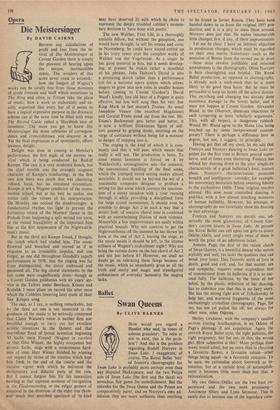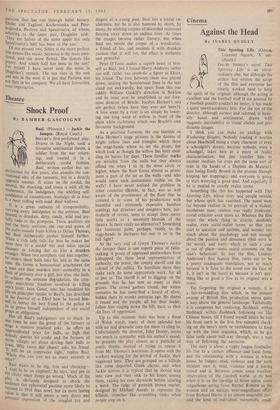Ballet
Swan Queens
By CLIVE BARNES to be found in Soviet Russia. They have been handed down to us from the original 1895 pro- duction and it is a pity to mess them around.
Nureyev does just that. He makes innumerable little changes, few, if any, of them improvements. Let me be clear. I have no intrinsic objection to production changes, which must be regarded on their own merits. Sometimes—such as the omission of Benno from the second pas de deux —these must involve justifiable and minimal
amendments to the choreography. Often Nureyev is here clearsighted and helpful. The Royal Ballet production, as opposed to choreography, is already such a mish-mash that he is more likely to do good than harm. But he must be persuaded to keep his hands off the actual dances. This switching and changing has already done enormous damage to the Soviet ballet, and it must not happen at Covent Garden. Alexander Bland, in the Observer, dismisses objections to such tampering as mere 'scholarly arguments.' This, with all respect, is dangerous rubbish Would Mr. Bland agree to the Mona Lisa being touched up by some inexperienced contem- porary? There is perhaps a difference here in degree, but not, 1 suggest, in principle.
Having got that off my chest, let me add that Fonteyn and Nureyev dancing in Swan Lake to- gether for the first time in Britain proved super- lative, and at times even shattering. Fonteyn has refined her dancing down to the utter simplicity characteristic of a great ballerina's final, mature phase. Nureyev's characterisation possesses breadth and intelligence—consider, for example, his momentary hesitation before swearing fidelity to the enchantress Odile. These original touches abound. His now more controlled dancing is god-like, with a few almost touching moments of human fallibility. However, his attempts at choreography do not invariably show his dancing to best advantage.
Fonteyn and Nureyev are merely one, ad- mittedly the most glamorous, of Covent Gar- den's current braces in Swan Lake. At present the Royal Ballet can call upon ten girls to dance Odette/Odile, and every single swan of them is worth the price of an admission ticket.
Annette Page, the first of the recent clutch of Swan Queens, is a beautiful dancer who moves stylishly and well, yet lacks the qualities that can break your heart. This Teutonic myth of love in death, good and evil, and, for that matter, sex and sympathy, requires some stupendous feat of commitment from its ballerina if it is to suc- ceed fully. The ballerina, by the force of her belief, by the plastic definition of her dancing, has to convince you that this is no fairy story. She has the strong right arm of Tchaikovsky to help her, and scattered fragments of the most enchantingly crystalline choreography. Page, for me, has not yet pulled this off; but always for other men, other Odettes.
Shirley Grahame, with the company's smaller section visiting Southampton, is an Odette of Page's plumage' if not experience. Again the smooth Royal Ballet style, the right patterns, the right poignancy, but for me, in this, the wrong girl. How subjective is this? More perhaps than many would admit, but no more than in choosing a favourite flower, a favourite soloist—other things being equal—in a favourite concerto. To be sure, we rationalise about footwork or in- tonation, but at a certain level of accomplish- ment it becomes little more than just that, a rationalisation.
My two Odette/Odiles are the two least ex- perienced and the two most promising— Antoinette Sibley and Lynn Seymour. This is surely due to become one of the legendary com- parisons that has run through ballet history. Elssler and Taglioni, Kschessinska and Preo- brajenska, Pavlova and Spessivtseva, of whom, referring to the latter pair, Diaghilev said: They are halves of the same apple but only Spessivtseva's half has been in the sun.'
Of our present two, Sibley is the more perfect.
She dances like music. Seymour is the more emo-
tional, and the more flawed. She dances like Poetry. And which half has been in the sun? For myself I have never seen the sense in Diaghilev's remark. The sun rises in the east and sets in the west. It is just that Pavlova was not then in his company. We all have favourites, even impresarios'



































 Previous page
Previous page